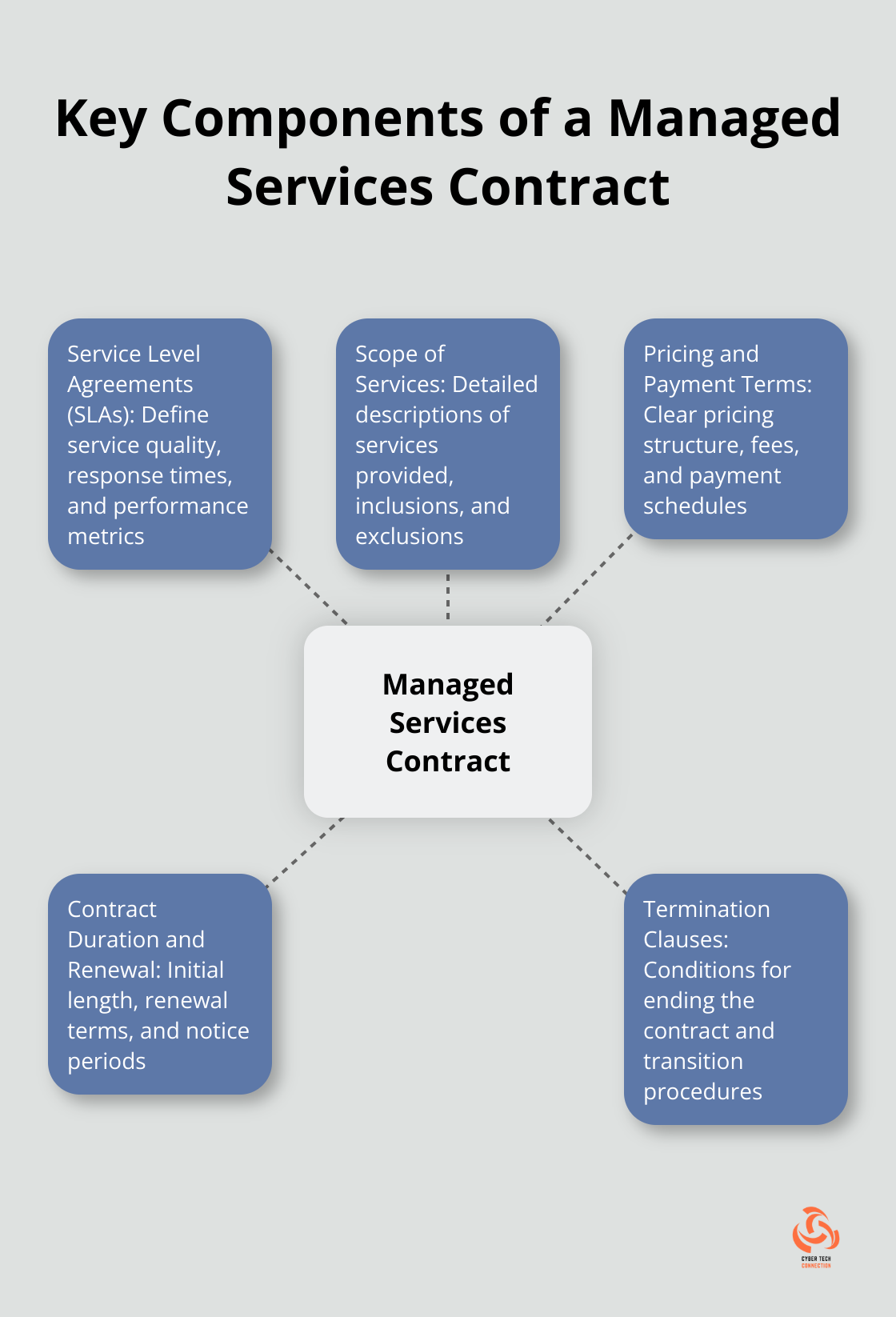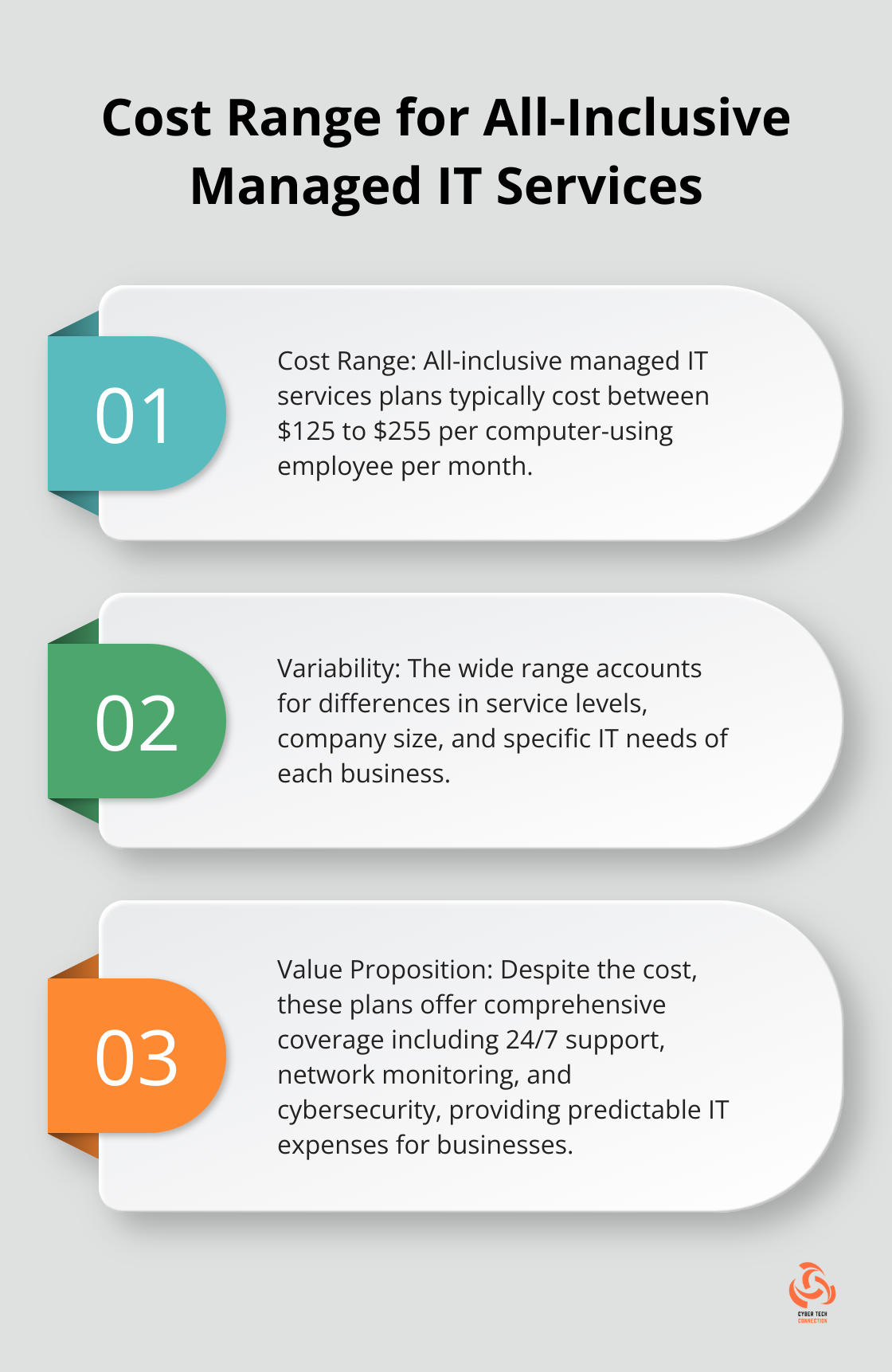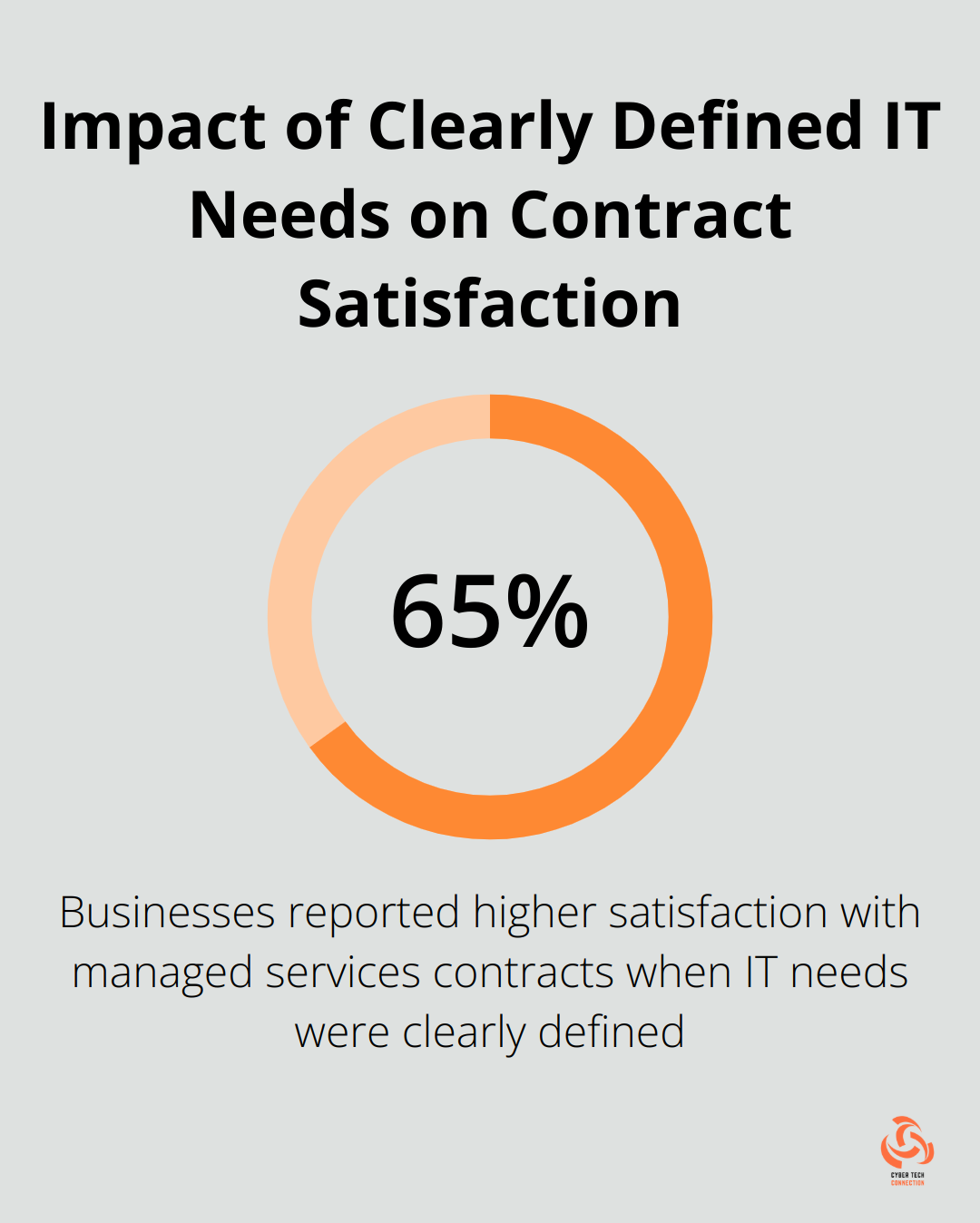Managed services contracts can be complex, but they’re essential for businesses looking to outsource their IT needs.
At CTC, we’ve seen how a well-structured contract can make or break a successful partnership between a company and its managed service provider.
This guide will break down the key components of these agreements, explore different contract types, and offer tips for effective negotiation.

What’s in a Managed Services Contract?
Service Level Agreements (SLAs)
Service Level Agreements (SLAs) form the core of your contract. They are legally binding contracts between a service provider and a customer that detail the scope, quality, and expectations of the service.
Key SLA elements to review:
- Response times for various issue severities
- Resolution timeframes
- Uptime guarantees
- Penalties for missed targets
Scope of Services
This section details the services you’ll receive. It should be comprehensive and specific to avoid misunderstandings and disputes.
A thorough scope of services includes:
- Detailed descriptions of each service
- Inclusions and exclusions
- Any limitations
- Service delivery methods
Pricing and Payment Terms
Clear pricing is essential. Look for transparent structures that match your budget and business needs.
Consider these pricing elements:
- Fixed vs. variable costs
- Additional fees or charges
- Payment schedules
- Price increase clauses
Contract Duration and Renewal
Most managed services contracts last 1-3 years. Longer contracts often offer better pricing but less flexibility. Short-term contracts allow more frequent reassessment but may cost more.
Key points to consider:
- Initial contract length
- Automatic renewal terms
- Notice periods for non-renewal
- Early termination options
Termination Clauses
Termination clauses provide clarity, mitigate risk, and ensure predictable outcomes when contracts end.
Address these key points:
- Notice periods for termination
- Grounds for termination (e.g., contract breach, insolvency)
- Transition assistance
- Data return or destruction procedures
Every business has unique needs, and your contract should reflect them. Don’t hesitate to negotiate terms that work for you. If a provider refuses to discuss adjustments, it might signal a problem.
Now that we’ve covered the key components of managed services contracts, let’s explore the different types of contracts you might encounter in the next section.
What Contract Type Fits Your Needs?
Managed services contracts come in various forms, each designed to meet different business needs and budgets. Understanding these types will help you choose the best fit for your organization.
All-Inclusive Contracts
All-inclusive contracts cover a wide range of IT services for a fixed monthly fee. These contracts typically include 24/7 support, network monitoring, cybersecurity, and more. They suit businesses that want predictable IT costs and comprehensive coverage. An all-inclusive managed IT services plan typically costs between $125-$255 per computer-using employee per month.

A La Carte Service Contracts
A la carte contracts allow businesses to select specific services they need. This flexibility benefits companies with unique IT requirements or those with some in-house IT capabilities.
For example, a small business might choose to outsource only their cybersecurity and cloud services while handling basic IT support internally.
Pay-As-You-Go Contracts
Pay-as-you-go contracts offer maximum flexibility. You only pay for the services you use, when you use them. This model attracts startups and small businesses with fluctuating IT needs.
However, it’s important to note that while this model offers flexibility, it can result in unpredictable monthly costs.
Tiered Service Contracts
Tiered service contracts offer different levels of support at varying price points. For instance, a basic tier might include essential services (like network monitoring and help desk support), while higher tiers add advanced services (such as cybersecurity and cloud management).
When selecting a contract type, consider your business size, IT needs, budget, and growth plans. The next section will guide you through the negotiation process to ensure you secure the best possible terms for your chosen contract type.
How to Negotiate Your Managed Services Contract
Assess Your IT Needs
Before you start negotiations, conduct a thorough assessment of your IT infrastructure and needs. This includes creating a catalog of your current systems, identifying pain points, and outlining your growth projections. A 2023 Deloitte survey revealed that 65% of businesses that clearly defined their IT needs before negotiations reported higher satisfaction with their managed services contracts.

Investigate Provider Capabilities
Don’t accept a provider’s word for their capabilities at face value. Request case studies, client references, and detailed explanations of their service delivery methods. Managed services provide ongoing IT support, while outsourcing offers task-based solutions. Learn which option best suits your business needs.
Plan for Future Growth
Your business won’t remain static, so your IT services shouldn’t either. Discuss how the provider handles scaling services up or down. Ask about their technology roadmap and how they plan to incorporate emerging technologies. IDC reports that contracts with built-in scalability clauses lead to 30% fewer mid-contract renegotiations.
Establish Concrete Response Times
Vague promises of “fast response times” don’t suffice. Push for concrete metrics. You might negotiate for a 15-minute response time for critical issues and a 4-hour resolution time for non-critical problems. The Information Technology Infrastructure Library (ITIL) recommends defining at least three priority levels for IT issues (each with specific response and resolution times).
Prioritize Security and Compliance
With cyber threats on the rise, security should top your list of priorities in negotiations. If you operate in a regulated industry, ensure the provider can meet your compliance requirements. The Ponemon Institute reports that businesses with robust security clauses in their managed services contracts experience 47% fewer data breaches than those without.
Negotiation isn’t about winning or losing. It’s about creating a partnership that benefits both parties. Prepare to compromise, but also know your non-negotiables. A well-negotiated contract sets the foundation for a long-lasting and productive relationship with your managed services provider.
Final Thoughts
Managed services contracts form the foundation of successful IT outsourcing partnerships. These agreements define the scope, expectations, and responsibilities between businesses and their IT providers. The contract type you select should match your specific needs, whether it’s an all-inclusive agreement or a more flexible model.
Effective negotiation plays a vital role in finalizing your managed services contract. Clear understanding of IT requirements, thorough provider vetting, and future growth planning set the stage for a beneficial relationship.
At Cyber Tech Connection, we craft comprehensive IT support agreements that align with your business objectives. Our team offers a wide range of services, from mobile defense to cloud solutions, to keep your technology running smoothly and securely. We invite you to explore how our managed services can drive your business forward in today’s business.

